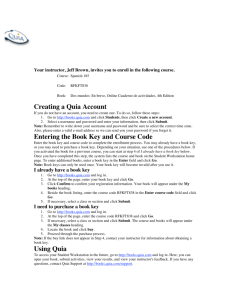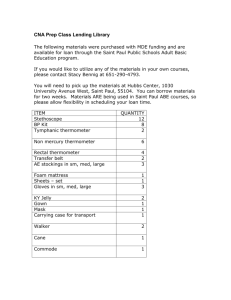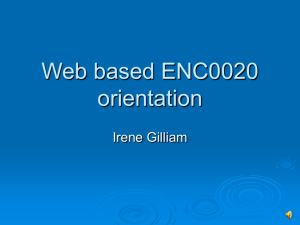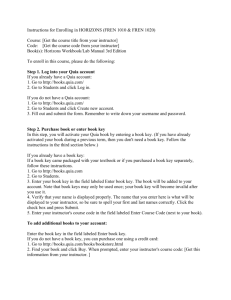SPAN_1103_302_30778_201530
advertisement
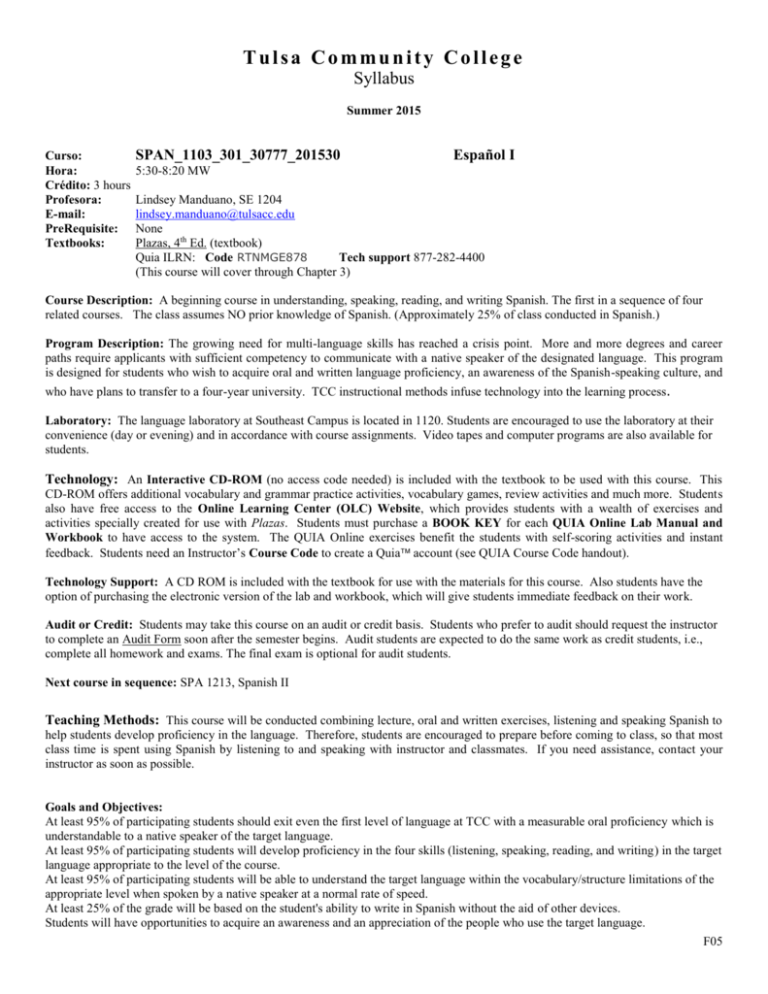
Tulsa Community College Syllabus Summer 2015 Curso: Hora: Crédito: 3 hours Profesora: E-mail: PreRequisite: Textbooks: SPAN_1103_301_30777_201530 Español I 5:30-8:20 MW Lindsey Manduano, SE 1204 lindsey.manduano@tulsacc.edu None Plazas, 4th Ed. (textbook) Quia ILRN: Code RTNMGE878 Tech support 877-282-4400 (This course will cover through Chapter 3) Course Description: A beginning course in understanding, speaking, reading, and writing Spanish. The first in a sequence of four related courses. The class assumes NO prior knowledge of Spanish. (Approximately 25% of class conducted in Spanish.) Program Description: The growing need for multi-language skills has reached a crisis point. More and more degrees and career paths require applicants with sufficient competency to communicate with a native speaker of the designated language. This program is designed for students who wish to acquire oral and written language proficiency, an awareness of the Spanish-speaking culture, and who have plans to transfer to a four-year university. TCC instructional methods infuse technology into the learning process. Laboratory: The language laboratory at Southeast Campus is located in 1120. Students are encouraged to use the laboratory at their convenience (day or evening) and in accordance with course assignments. Video tapes and computer programs are also available for students. Technology: An Interactive CD-ROM (no access code needed) is included with the textbook to be used with this course. This CD-ROM offers additional vocabulary and grammar practice activities, vocabulary games, review activities and much more. Students also have free access to the Online Learning Center (OLC) Website, which provides students with a wealth of exercises and activities specially created for use with Plazas. Students must purchase a BOOK KEY for each QUIA Online Lab Manual and Workbook to have access to the system. The QUIA Online exercises benefit the students with self-scoring activities and instant feedback. Students need an Instructor’s Course Code to create a Quia account (see QUIA Course Code handout). Technology Support: A CD ROM is included with the textbook for use with the materials for this course. Also students have the option of purchasing the electronic version of the lab and workbook, which will give students immediate feedback on their work. Audit or Credit: Students may take this course on an audit or credit basis. Students who prefer to audit should request the instructor to complete an Audit Form soon after the semester begins. Audit students are expected to do the same work as credit students, i.e., complete all homework and exams. The final exam is optional for audit students. Next course in sequence: SPA 1213, Spanish II Teaching Methods: This course will be conducted combining lecture, oral and written exercises, listening and speaking Spanish to help students develop proficiency in the language. Therefore, students are encouraged to prepare before coming to class, so that most class time is spent using Spanish by listening to and speaking with instructor and classmates. If you need assistance, contact your instructor as soon as possible. Goals and Objectives: At least 95% of participating students should exit even the first level of language at TCC with a measurable oral proficiency which is understandable to a native speaker of the target language. At least 95% of participating students will develop proficiency in the four skills (listening, speaking, reading, and writing) in the target language appropriate to the level of the course. At least 95% of participating students will be able to understand the target language within the vocabulary/structure limitations of the appropriate level when spoken by a native speaker at a normal rate of speed. At least 25% of the grade will be based on the student's ability to write in Spanish without the aid of other devices. Students will have opportunities to acquire an awareness and an appreciation of the people who use the target language. F05 Degree Application: Associate in Arts degree, Associate in Applied Science, and the Certificate. Grading Policy Spa 1103 Evaluation Each evaluation will be assigned a number of points. At the end of the semester, all points will be totaled and a letter grade will be based on the total. Final grades will be determined on an individual basis and not through competitions with classmates. The grades for this course will be calculated on the following basis: I. Chapter Assessments, Mid-term and Final Oral Test (Total 260 Points) Chapter Preliminar 50 points Chapter 1 50 points Chapter 2 50 points Chapter 3 Final 50 points Mid-Term Oral Test 30 points (one on one oral) Final Oral Test 30 points (one on one oral) (Students who participate fully in Chat Lab will be exempted from the oral final) Students who fail to take the final will receive an “I” grade (incomplete) which must be made up by the date indicated on the “I” form II. Participation and assignments - (60 total points) Assignments: Preliminar (WB/LB) 15points Chapter 1 (WB/LB) 15 points Chapter 2 (WB/LB) 15 points Chapter 3 (WB/LB) 15 points (Oral participation grades are taken in each class meeting. No grade can be given if student is absent or does not participate. The points are based on approximately one point per class participation per class meeting.) Grading Scale (Total Points 320 Possible ) 288-320 =A 287-256- =B 255-224=C 223- 192 =D Below 192 =F Attendance The nature of this course requires that most learning take place during class time. Students who have more than FOUR hours absent usually do not perform successfully on assessments or in class participation (For example, one day absence in 8-week courses is the equivalent of two days in a 16-week semester.) Absent students can receive no “participation” credit for the days they are absent. Late Assignments No more than FOUR late assignments will be accepted during the 16-week classes or TWO late assignments in the 8week classes. Also no late assignments will be accepted on the last day of class. Make-up Policy for Spanish 1103 requires students to check with their instructor concerning make-up of exams. Delays of exams are discouraged since they are timed to coincide with the best learning/performance period for the students. In general, the late exam will be devalued 5 points or 10% whichever is less. Also the exam must be made up BEFORE the next class meeting. Otherwise, the student will receive a zero for this exam. Electronics Electronic devices (cell phones, pagers, etc.) are not permitted and should not be activated during class time. Student in possession of these devices are responsible for making sure these are TURNED OFF or are turn to “silent.” Video cameras and cassettes recorders require prior approval of the instructor. Students who cannot comply with the above policies will be asked to leave the room. These devices interrupt class activities and infringe on the rights and learning opportunities of other students. F05 Failure to Withdraw Policy: If the student ceases to attend class, it is his or her responsibility to “Withdraw” officially from the course. Failure to do so may result in the student’s receiving a grade of “F” at the end of the semester. Otherwise, the student will receive the grade earned based on his/her work for the semester. ADA Policy: STUDENTS WITH SPECIAL NEEDS: Students with documented disabilities are provided academic accommodations through the disabled Student Resource Center (918-595-7115) or Resource Center for the Deaf and Hard of Hearing (918-595-7428), TDD-TTY (918-595-7434). If any student is in need of academic accommodations from either office, it is the student’s responsibility to advise the instructor so an appropriate referral can be made no later than the first week of class. Students may also contact the disabled Student Services Offices directly at the telephone numbers indicated. ACADEMIC ACCOMMODATION WILL NOT BE PROVIDED UNLESS APPROPRIATE DOCUMENTATION IS PROVIDED TO THE DISABLED STUDENT SERVICES OFFICES TO SUPPORT THE NEED. COMMUNICATIONS: Course Withdrawal: The deadline to withdraw from a course shall not exceed 3/4 the duration of any class. Check the TCC Academic Calendar for the deadline that applies to your course(s). Begin the process with a discussion with the faculty member assigned to the course. Contact the Advisement Office at any TCC campus to initiate withdrawal from a course ("W" grade) or to change from "Credit" to "Audit." Withdrawal and/or change to an Audit from a course after the drop/add period may alter the financial aid award for the current semester and future semesters. Students may receive an outstanding bill from TCC if the recalculation leaves a balance due to TCC. Students who stop participating in the course and fail to withdraw may receive a course grade of "F," which may have financial aid consequences for the student." Communications: a. Email communications: All TCC students receive a designated “MyTCC” email address (ex: jane.doe@mail.tulsacc.edu). All email communications to you will be sent to your MyTCC email address; and you must use MyTCC email to send email to, and receive email from, the instructor regarding this course. b. Inclement Weather: TCC rarely closes. If extreme weather conditions or emergency situations arise, TCC always gives cancellation notices to radio and television stations. This information is also posted on the TCC website (www.tulsacc.edu). General Education Goals: General Education courses at TCC ensure that our graduates gain skills, knowledge, and abilities that comprise a common foundation for their higher education and a backdrop for their work and personal lives. TCC’s General Education goals are: Critical Thinking, Effective Communication, Engaged Learning, and Technological Proficiency. Classroom Etiquette: Open and mutually respectful communication of varied opinions, beliefs, and perspectives during classroom or online discussion encourages the free exchange of ideas that is essential to higher learning and to the ability to learn from each other. Use of any electronic device is at the discretion of the instructor. Syllabus Changes: Occasionally, changes to the syllabus may be necessary. Students will be notified of any changes to the syllabus in writing. Students with Disabilities: TCC provides accommodations for qualifying students in compliance with the Americans with Disabilities Act. For information, students may contact the disabled Student Resource Center, 918-595-7115, or the Resource Center for the Deaf and Hard of Hearing, 918-595-7428V, 918-595-7434TTY. Academic Dishonesty: Academic dishonesty (cheating) is defined as the deception of others about one’s own work or about the work of another. Academic dishonesty or misconduct is not condoned or tolerated at campuses within the Tulsa Community College system. Tulsa Community College adopts a policy delegating certain forms of authority for disciplinary action to the faculty. Such disciplinary actions delegated to the faculty include, but are not limited to, the dismissal of disrespectful or disorderly students from classes. In the case of academic dishonesty a faculty member may: require the student to redo an assignment or test, or require the student to complete a substitute assignment or test; Record a "zero" for the assignment or test in question; Recommend to the student that the student withdraw from the class, or administratively withdraw the student from the class; Record a grade of "F" for the student at the end of the semester. Faculty may request that disciplinary action be taken against a student at the administrative level by submitting such request to the Dean of Student Services. F05 Institutional Statement: Each student is responsible for being aware of the information contained in the TCC Catalog, the TCC Student Policies & Resources Handbook, and semester information listed in the class schedule. All information may be viewed on the TCC website: www.tulsacc.edu TCC Spanish I Summer 2015 Lindsey Manduano (SUBJECT TO CHANGE) Class 1 2 No. Date 4 Assignments Capítulo Preliminar - ¡Mucho gusto! Greetings/good-byes, numbers, question words Vocabulario escencial (p. 18) Read p.1-7, 12-13 (top 1/2 of pages), 18. Learn how to work with Quia. Vocabulario, Saludos & despedidas En contexto Encuentro cultural – Communities Estructura – Talking about yourself & others, Subject pronouns & the present tense of the Verb "ser" (to be) (p. 10-11) Así se dice – Identifying quantities, "Hay" and Numbers 0-30 (p. 12-13 bottom 1/2) Text p. 2-5 in class, activities, pair practice. Study maps of Latin American countries. Read p. 8-11. 6/8 Continue w/numbers (Así se dice) Vocabulario – Palabras interrogatives (p. 14) Encuentro cultural – Latin America & Spain Review for Chapter Test & Explanation of testing procedures. Practice with math in Spanish p. 12-13. Pair practice in class, Practice exercises for test. 6/10 EXAMEN– Capítulo Preliminar. Ch. 1 Objectives, People & Things in the classroom Vocabulario – en la clase (p. 20-23) Activities p. 20-31 and 32-33. We will do exercises and pair practice as we have done before. 6/1 6/3 3 Topic Quia exercises for Chapter Preliminar due by 11:59 p.m. 6/15 En contexto – university studies (p. 24-25) Vocabulario escencial (p. 48) Estructura I – Talking about people, things & concepts, Definite & indefinite articles, gender, & how to make nouns plural (p. 26-27) Read and do exercises p. 26-31. 6 6/17 Read p. 48, 34-37, 42-43. 7 6/22 Vocabulario – Lenguas extranjeras, otras materias y Lugares universitarios (p. 28-31). Encuentro cultural – Estados Unidos (p. 32-33) Estructura II – Describing everyday activities, Present tense of "ar" verbs (p. 34-37) ¡A ver! – video activities Así se dice – Telling time & telling about likes & dislikes, days of the week/La hora y los días de la semana (p. 38-39) 8 6/24 5 Read p. 38-41, 44-48. Will do exercises p. 40-41 in class to study for the test. ¡A repasar! (p. 40-41) ¡A leer! (p. 44-45) ¡A escribir (p. 46-47) Prepare for oral midterm F05 9 6/29 10 7/1 11 7/8 12 7/10 EXAMEN, Capitulo 1 Chapter 2 objectives – En una reunion familiar (family reunion) Vocabulario – La familia (p. 50-53) En contexto – visiting grandparents (p. 54-55) Vocabulario esencial (p. 84) Así se dice – Indicating ownership & possession, Possession w/de(l) & possessive adjectives. Estructura I – Describing people & things; Common uses of the verb "ser" (p. 58-59) Así se dice – Describing people & things, agreement with descriptive adjectives (p. 60-63) Discuss Encuentro Cultural – México p. 64-65. Oral mid-term exam Vocabulario – Las nacionalidades p. 66-67 Estructura II – Describing daily activities at home or at school, present tense of "er" "ir" verbs (p. 7071) Así se dice – Expressing possession, age & physical states, common uses of the verb "tener" (p. 72-73) Así se dice – Counting to 100/Los números de 30 a Activities & pair practice p. 49-55, read Encuentro cultural p. 64-65 and practice vocab p. 84. Work with possessives p. 56-57. All Quia Chapter 1, due by 11:59 p.m Read p. 84, 56-65. Activities & pair practice in class. 2-22 (p. 63) EXAMEN Chapter 2. Ch. 3 objectives – El tiempo libre – Colombia Vocabulario – Los deportes y los pasatiempos (p. 86-89) Estructura I – Expressing likes & dislikes/gustar + infinitive and gustar + nouns (p. 92-95) Read p. 66-73. In class activities, pair practice. Match languages, countries & nationalities. Work with verbs. 7/15 Vocabulario – los lugares (places) (p. 98-99) Estructura II – Expressing plans w/"ir"; ir a + destination/+ infinitivo (p. 100-103) Estructura III – Describing leisure time activities, Verbs w/irregular "yo" forms (p. 104-107) Will work on activities p. 85-91. Read encuentro cultural p. 96-97. Practice vocabulario esencial on p. 120. 14 7/17 Así se dice – Expressing knowledge & familiarily – saber, conocer & the personal "a" (p. 108-109) Así se dice – Talking about the months, seasons & the weather (p. 110-111) ¡A repasar! (p. 112-113). ¡A escribir! (p. 118-119) 15 7/22 EXAMEN Chapter 3 Oral final where necessary 13 Read p. 74-83. Classroom activities, pair practice F05 Your instructor, Lindsey Manduano, invites you to enroll in the following course. Course: Español 1 Code: RTNMGE878 Book: Plazas 4th Edition iLrn: Heinle Learning Center CREATING A QUIA ACCOUNT If you do not have an account, you need to create one. To do so, follow these steps: 1. Go to http://books.quia.com and click Students, then click Create a new account. 2. Select a username and password and enter your information, then click Submit. Note: Remember to write down your username and password and be sure to select the correct time zone. Also, please enter a valid e-mail address so we can send you your password if you forget it. ENTERING THE BOOK KEY AND COURSE CODE Enter the book key and course code to complete the enrollment process. You may already have a book key, or you may need to purchase a book key. Depending on your situation, use one of the procedures below. If you activated the book for a previous course, you can start at step 4 of I already have a book key below. Once you have completed this step, the system lists the course and book on the Student Workstation home page. To enter additional books, enter a book key in the Enter field and click Go. Note: Book keys can only be used once. Your book key will become invalid after you use it. I already have a book key 1. 2. 3. 4. 5. Go to http://books.quia.com and log in. At the top of the page, enter your book key and click Go. Click Confirm to confirm your registration information. Your book will appear under the My books heading. Beside the book listing, enter the course code RTNMGE878 in the Enter course code field and click Go. If necessary, select a class or section and click Submit. I need to purchase a book key, or would like to access a free 3-week trial. 1. Go to http://books.quia.com and log in. 2. At the top of the page, enter the course code RTNMGE878 and click Go. 3. If necessary, select a class or section and click Submit. The course and books will appear under the My classes heading. 4. Locate the book and click buy. 5. Proceed through the purchase process. If you are not ready to purchase your book key and would like to access a free 3-week trial, follow the instructions on this page. Note that 3-week trials are not available for all titles. Note: If the buy link does not appear in Step 4, contact your instructor for information about obtaining a book key. USING QUIA To access your Student Workstation in the future, go to http://books.quia.com and log in. Here, you can open your book, submit activities, view your results, and view your instructor's feedback. If you have any questions, contact Quia Support at http://books.quia.com/support. F05
